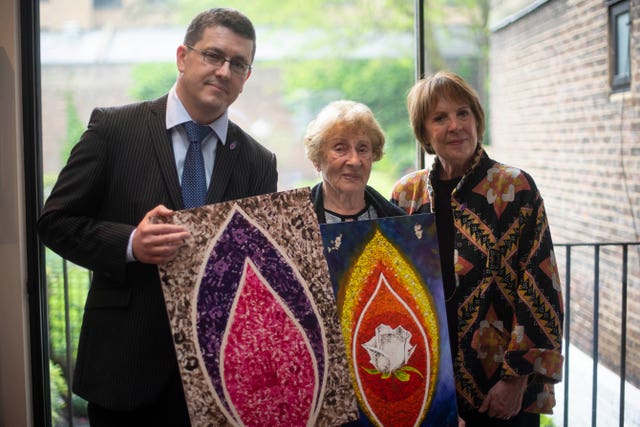Dame Penelope Wilton: Misinformation allows anti-Semitism to have a voice
The actress joined a small group of Holocaust survivors to mark the launch of next year’s Holocaust Memorial Day theme – Stand Together.

The politics around Brexit and spread of misinformation has allowed prejudice and anti-Semitism to flex its muscles, actress Dame Penelope Wilton said.
The Downton Abbey star said disappointment around how Brexit has been handled and the election of US President Donald Trump has given people a “licence” to share their prejudices.
Dame Penelope joined a small group of Holocaust survivors in north London on Tuesday to mark the launch of next year’s Holocaust Memorial Day theme – Stand Together.
She said: “I think it’s very important now, because the rise of this populism and this ruling through a sort of fear of somebody different, and finding scapegoats, is starting again, and I think it’s a very, very dangerous time in Europe.
“And I think Brexit isn’t helping, I think it’s terrible what’s happened, actually, and I think we will have to be very aware of what’s going on, in Poland, Hungary, Holland – and here.
“We must make people aware that it’s not going to happen again.”
Dame Penelope said she felt education was key to combating misinformation and Holocaust denial as “ignorance breeds these sorts of conspiracy theories”.
She continued: “I think it (prejudice) has always been there, it’s just been allowed to have a voice now by the politics and misinformation. I don’t think these things go away, but I think they are allowed to have a voice and they are allowed to use their muscle.”

She added that the way political rhetoric has pitted groups against each other “gives people a licence to show their prejudices because of their disappointment”.
Dame Penelope’s father was a prisoner of war in Italy and Germany and rarely shared his experiences.
She said: “The only thing he said about his incarceration – I said ‘oh Dad, that must have been terrible’, and he said ‘I wasn’t a Jew’. That was the only thing he said.”
Next year will be especially poignant for Holocaust survivors because it marks 75 years since the liberation of Auschwitz death camp in German-occupied Poland.
One of those who escaped was 89-year-old Lilly Ebert, who said unity and tolerance were essential “especially now when the world is so upside-down and anti-Semitism is so terrible”.
As she spoke she clutched a gold pendant – the only gold, she said, to have gone in and out of the Auschwitz concentration camp.
Mrs Ebert hid the jewellery first in the heel of her shoe when she arrived aged 14 from her Hungarian hometown of Bonyhad, and then in her daily bread rations.
She said: “I was there. I went through this. For me, I remember. In a few years’ time, it will be history.
“Nobody will be here from the survivors and that’s why it is so important to tell this story.”
Laura Marks, chairwoman of the Holocaust Memorial Day Trust, which will organise the commemorations, said of the theme Stand Together: “We chose (it) because we feel that, particularly right now where Britain and the world seems to be so divided and people can’t agree on anything and everything seems to be polarised.
“We thought we should have a theme that was about the core issue which was actually standing together, being one society, one community, people looking after each other, people standing up for each other and caring for each other.”
Holocaust Memorial Day is marked internationally each year on January 27.
